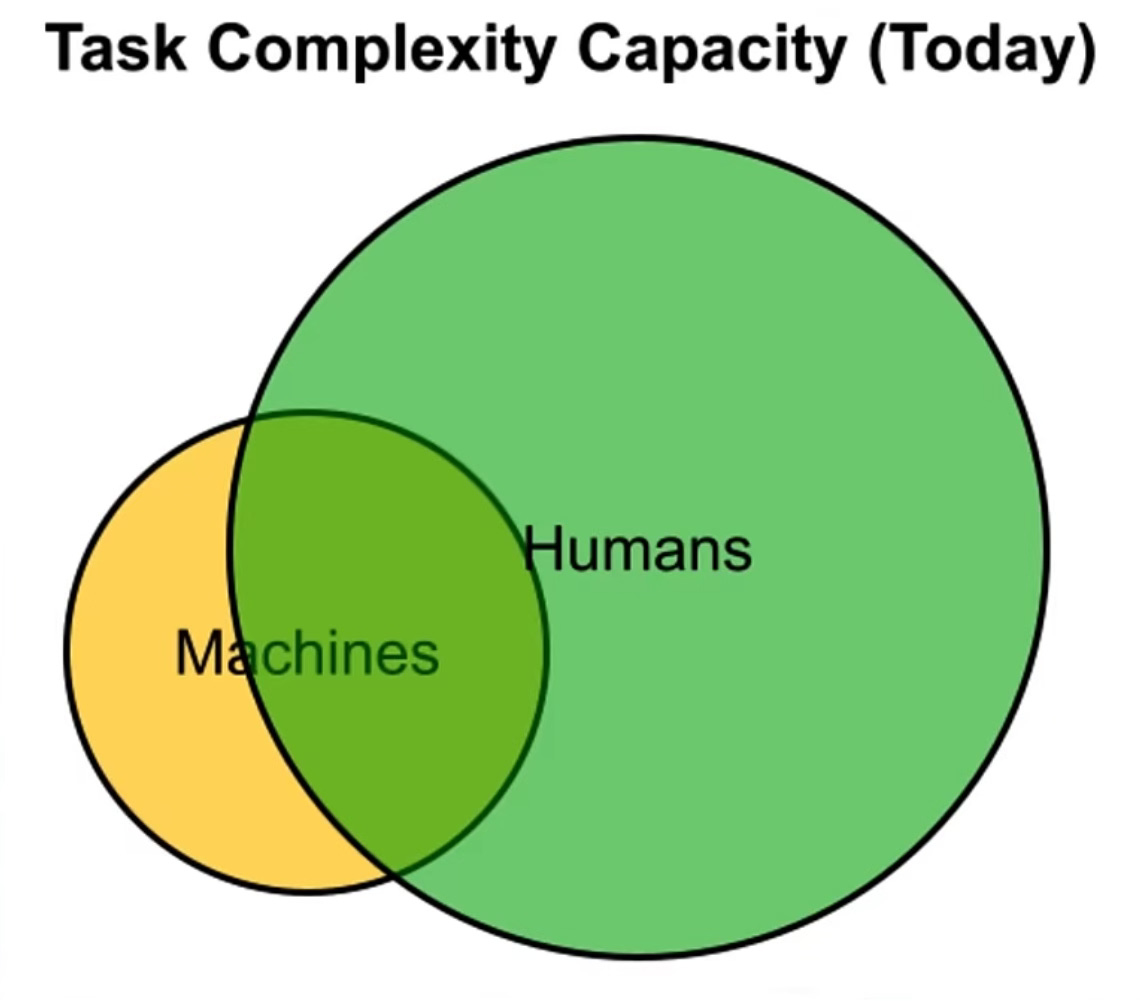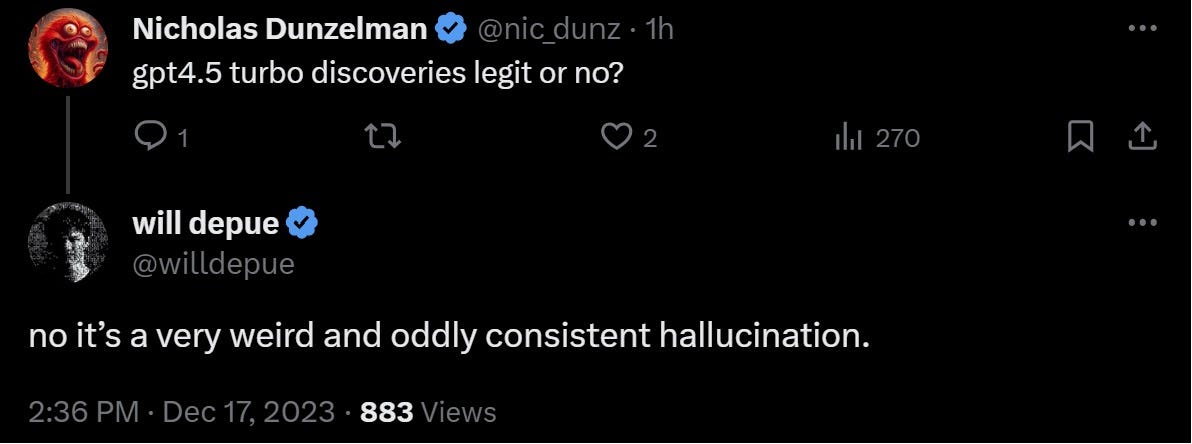Apple to Zebra comparison (033)
Exploring many kinds of human-machine augmentation.
Happy Monday and welcome to a brief edition of Artificial Insights. The year is coming to an end, and many feel overwhelmed.
After 33 editions, or circa 150 commented links, my article backlog contains nearly 200 additional links which caught my attention but which haven’t made their way into the newsletter yet.
I have no idea which approach is ideal when it comes to learning about a new area of knowledge - but I am happy to say the number of subscribers and opening rate for this very newsletter has proven successful. We recently crossed the 1.000 reader mark on LinkedIn and the Substack edition regularly receives 45-50% opening rates, which means Artificial Insights is resonating.
This week’s edition features a couple of lectures from TEDxAI in San Francisco and a handful of articles about current developments. My plan for the holidays is to go through some of the backlog and keep publishing every Monday. I hope to see you around!
MZ
Investor Cathie Wood highlights a unique moment in technology marked by the simultaneous evolution of five key innovation platforms, with AI as a pivotal force. She anticipates a surge in global GDP growth and productivity, driven by AI, predicting that these technologies could generate trillions in revenue in the next five to ten years. AI is expected to enable the most significant productivity increase in history, potentially increasing the productivity of knowledge workers fourfold by 2030.
Economic Catalyst: AI is poised to be a significant catalyst for economic growth, potentially leading to a productivity increase unparalleled in history.
Monumental Projections: Projections suggest AI could increase global labor productivity by about $200 trillion, radically transforming the economic landscape.
Balancing Act: While AI promises economic benefits, there's a need to address concerns about job displacement and increasing inequality.
Yann LeCun, Meta's Chief AI Scientist, discusses AI's progress over the last decade, including content moderation and emergency braking systems. He reflects on his journey in AI, highlighting the resurgence of neural networks and deep learning. Advocating for open AI research, LeCun compares AI's future to the internet's evolution. He emphasizes objective-based models and the need for protective measures against autonomous weapons' risks. Despite ethical concerns, LeCun is optimistic about AI's role in enhancing intelligence and job automation, dismissing fears of a sudden superintelligent AI threat.
Progress Summary: LeCun notes significant AI advancements in content moderation and emergency systems.
AI's Future Outlook: Advocates open AI research, comparing its potential impact to the internet.
Ethical Balance: Stresses the need for safeguards against autonomous weapons, while being optimistic about AI's benefits.
Rob Toews, in his TED Talk, highlights the critical role of Taiwan Semiconductor Manufacturing Company (TSMC) in the global AI ecosystem. TSMC is pivotal in producing advanced AI chips for major tech giants like Nvidia, Google, and AMD. The company's unique position has led to a global dependency, making it a single point of failure in the chip industry. Toews also discusses the geopolitical implications, especially concerning the U.S.'s efforts to reduce reliance on East Asian chip facilities, and the risks if China were to control Taiwan, potentially crippling AI chip production globally.
Global Dependence: TSMC's monopoly in AI chip production creates a single point of failure, affecting all major tech firms.
Geopolitical Risks: Potential Chinese control over Taiwan could disrupt global AI development by halting advanced chip production.
Industry Dynamics: Intel's manufacturing struggles highlight the challenges in diversifying AI chip production sources.
David Shapiro and Anton Corck discuss the impact of AGI on job automation. Corck, a Brookings Institute fellow and UVA Economics professor, examines the "frontier of automation" and its expansion due to AI advancements. They predict a potential complete job automation in 5 to 20 years, with unbounded human task complexity still falling short against machine capabilities. Shapiro outlines three scenarios: business as usual, 20-year baseline, and an aggressive 5-year timeline. The discussion includes job displacement risks, the paradox of automation outpacing human productivity, and economic implications, such as wage trends and the survival of certain job types like nostalgic, experience, and care jobs.
Expanding Automation: AI's capabilities are rapidly advancing into new domains, intensifying job automation risks.
Economic Shifts: Wages and productivity may grow, plateau, or decline with automation, affecting the global economy.
Job Resilience: Certain jobs, like nostalgic and care roles, may persist as automation overtakes most economic sectors.
🍏🦓
Comprehensive list of AI keynotes
With commentary by Jeremy Connell-Waite on LinkedIn.
Visualizing LLMs
Visual walkthrough of the GPT large language model, exploring nano-gpt with a 85,000 parameters. On Bbycroft.net via Hacker News.
The EU approach to policy-making around AI
“The jury is still out about whether you can regulate this technology or not,” said Andrea Renda, a senior research fellow at the Center for European Policy Studies, a think tank in Brussels. “There’s a risk this E.U. text ends up being prehistorical.”
Emerging Vocabulary
Base Model
Pre-trained neural network that serves as a starting point for further training or fine-tuning on specific tasks or datasets. These models are typically trained on large, diverse datasets to learn a wide range of features and patterns. The base model encapsulates this generalized understanding, which can then be adapted to more specialized applications, improving efficiency and performance in learning task-specific nuances. This approach leverages transfer learning, where knowledge gained in one context is applied to different but related problems.
View all emerging vocabulary entries →
If Artificial Insights makes sense to you, please help us out by:
Subscribing to the weekly newsletter on Substack.
Following the weekly newsletter on LinkedIn.
Forwarding this issue to colleagues and friends.
Sharing the newsletter on your socials.
Commenting with your favorite talks and thinkers.
Artificial Insights is written by Michell Zappa, CEO and founder of Envisioning, a technology research institute.
You are receiving this newsletter because you signed up on envisioning.io.






